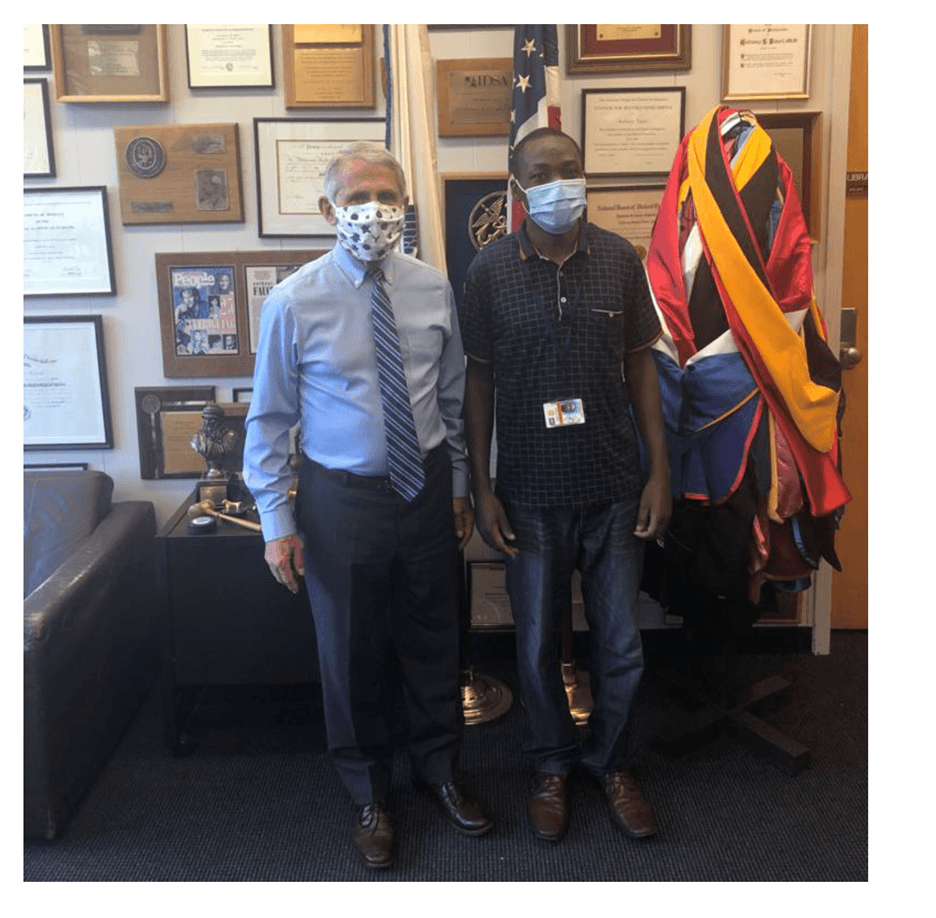News

Friday, August 7, 2020
Bartholomew N. Ondigo is a biomedical researcher and African Postdoctoral Training Initiative (APTI) Fellow based at National Institute of Allergy and Infectious Diseases (NIAID), in USA. APTI is implemented through the Alliance for Accelerating Excellence in Science in Africa (AESA), a funding, agenda setting and programme management platform of the African Academy of Sciences (AAS) and the African Union Development Agency (AUDA-NEPAD) supported by the U.S. National Institutes of Health (NIH) and the Bill & Melinda Gates Foundation. APTI trains African researchers in global health and develops their skills in clinical and translational research.
In April 2018, a request for applications was released for a prestigious APTI fellowship allowing Africans to spend two years at the NIH before returning to their home institutions where they are provided with 50% salary support for an additional two years to assist their transition into independent researchers.
I applied for the APTI fellowship to acquire research skills, establish professional relationships and develop collaborations at the NIH, one of the world’s most prestigious biomedical research institutions, where dozens of NIH-supported scientists from around the world have received Nobel Prizes for their groundbreaking achievements in Physiology or Medicine; Chemistry and even Physics.
Choose the right mentors and submit your application early
To win the competitive fellowship, I had to carefully choose the right mentors and supervisors to support my application and write strong, evidence-based recommendations. I asked my longtime PhD mentor and my postdoctoral mentor, both of whom I had collaborated with to publish multiple research papers, to provide letters of support. Recommendations were also required from two local (Kenyan) mentors, so I approached our Vice Chancellor at my university and the Director of the Research Institute. This combination of mentors and supervisors formed a compelling network of support for my application.
I exhausted all available resources over two weeks to make certain my submission was in the best shape possible. My submission was on studying the role of M1 and M2 macrophages in the pathogenesis of placental malaria. I then put it aside for one week and revisited the application on the fourth week to edit and revise it with fresh eyes, ensuring that I made a clear, logical case for my selection. Net of this process, I asked a trusted confidante colleague to proofread and critique the application, then submitted it, accounting for suggested revisions, two days before the deadline.
Prepare well for your interviews and consult for guidance
 The long, anxious waiting period began. I checked my email every morning for two months. Finally, I received separate emails from four scientists at the NIH, requesting interviews by Skype or phone call. This was an encouraging indication that my fellowship application had passed the first round. While naturally reassuring, it also increased the pressure because I expected stiff competition moving forward as preliminarily successful candidates would be narrowed down and selected.
The long, anxious waiting period began. I checked my email every morning for two months. Finally, I received separate emails from four scientists at the NIH, requesting interviews by Skype or phone call. This was an encouraging indication that my fellowship application had passed the first round. While naturally reassuring, it also increased the pressure because I expected stiff competition moving forward as preliminarily successful candidates would be narrowed down and selected.
The AAS represents all African countries, so I knew that applications were submitted from across the Continent. I was also aware that I was up against other talented young scholars who shared my dream to become fellows at the NIH. I tried to temper my hopes: how would I cope if I were rejected? I channeled my energy into contemplation of a mock interview, thinking of specific topics and questions that were likely to arise: “Why are you interested in a post-doc position? What skills can you bring to the lab? What do you hope to gain from the post-doc experience?” I also crafted my own questions to ask the NIH scientists should I be given that opportunity in the interview.
The more I prepared, the more comfortable I became, my confidence increasing. I remembered my father’s admonition: “You have to shine, forward ever and backward never”. During the interview week, I engaged in fruitful question-and-answer sessions with the NIH scientists and insightful discussions with many of them. I solicited my mentor for advice on how to select which fellowship to accept. All the labs with which I interviewed with, were led by successful scientists with a track record of mentorship, so I ultimately was matched with the Laboratory of Malaria Immunology and Vaccinology (LMIV) which would provide the additional expertise/skill sets, building on my previous research area of interest and of interest to my home institution.
I took from this experience three lessons:

.jpg&w=3840&q=75)


